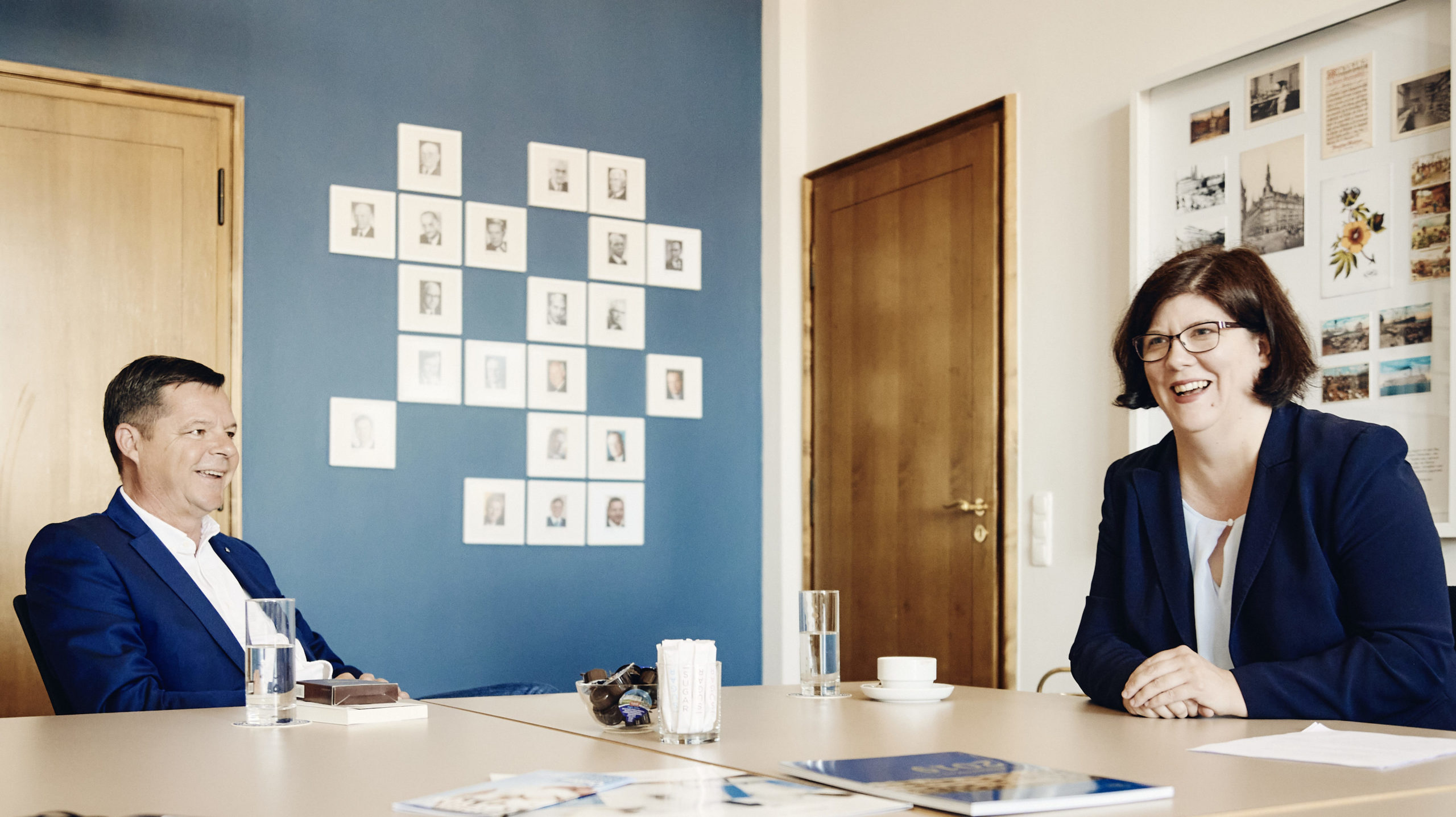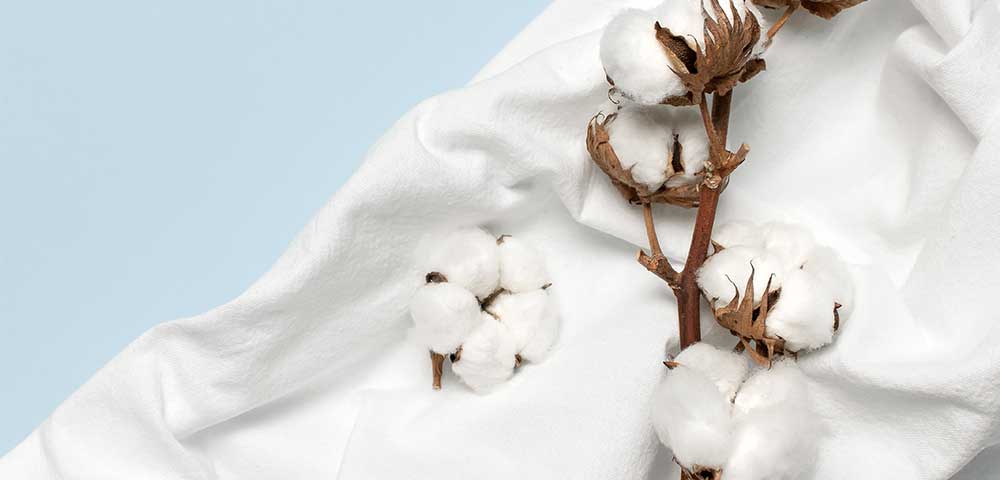Following her election in June, Stephanie Silber has become the first woman to head the Bremen Cotton Exchange. She took over from Jens D. Lukaczik, who has run the Bremen Cotton Exchange for the past two years. In an interview with the Cotton Report editorial team at the handover of office in early July, both clarify the position of the Bremen Cotton Exchange within the global cotton supply chain, while also defining new areas of responsibility. All with the aim of mastering current and future challenges. At the same time, they were not sparing in their criticism of the industry.

talking to the Cotton Report editors
“Have a cigarette with …”: the days of smoking at the Bremen Cotton Exchange are long gone. Nevertheless, the new president brought along a box of good cigars with her for the outgoing president. It was reminiscent of a column in a large German weekly newspaper and created a relaxed atmosphere during the informative discussion.
Cotton Report: Mr Lukaczik, in retrospect, what has especially shaped your term of office? Were you able to implement your plans?
Jens D. Lukaczik: The two years of my term from June 2018 to June 2020 should stand out through consolidation – this was also the goal of the entire executive committee. The years before had been marked by many changes and investments. We kept the ship on course and at constant speed. Nevertheless, we have achieved a lot. The larger projects included deepening our relationship with the German Society for International Cooperation (GIZ). Our cooperation with GIZ is based on trust and reliability. In addition, we have now significantly expanded our range of work in-house across the entire cotton supply chain. The aim is to address retailers and end consumers directly. In doing so, we are closing a communication gap that is important for the cotton industry and the Cotton Exchange.

How does the presidency that has just ended differ from your first term in 2011/12?
Jens D. Lukaczik: There are serious differences. My first term in office from 2010 to 2012 was like breaking new ground for the cotton exchange. We initiated a decisive reorientation and restructuring. The executive committee developed the three-pillar model for leadership based on the tasks of the Cotton Exchange, as well as a new strategy for international cooperation. The creation of ICA Bremen together with ICA Liverpool illustrates our aspiration to be the global centre for cotton quality and testing here in Bremen. In this context, it was particularly important to us to establish “Bremen” as an important part of the brand name and to anchor it within the cotton world. This was accompanied by extensive investments in laboratory equipment, with which the Bremen Cotton Exchange initially bore the entrepreneurial risk. All in all, this was a challenging fairway and cannot be compared to the relatively calm waters of the past two years.
Your company Cargo Control is a global service provider in the cotton trade network. What are the challenges for your company at the present time?
Jens D. Lukaczik: As a service provider in the cotton trade, the most important question for us is whether the ports are functional. As a globally active company, the current pandemic presents us with a number of challenges. We are trying to adapt to the many different measures and their implementation in the different countries and continue to offer our services in the best possible way. Sometimes this can lead to conflicts between customer requirements and compliance. We cannot influence many of the consequences. In the long term, we will face the task of having to deal with changing behaviour in demand.
Mr Lukaczik, what are your recommendations for Ms Silber, who has now taken over as president?
Jens D. Lukaczik: Far be it for me to give tips. As a free spirit, Ms Silber has new ideas, which she should implement without any possibly influencing advice from me. We can look back on great and reliable cooperation within the executive committee. I am convinced that it will stay that way.

Ms Silber, the production and trade in cotton as well as its processing have been characterised by uncertainty over the past two years. Keywords here are the US-China trade conflict and Brexit and now there is a pandemic. What does this mean for the cotton industry today? How do you assess the long-term effects?
Stephanie Silber: At the moment we can only speculate about the long-term effects, as it is not yet foreseeable how long the coronavirus will still be with us. What we are currently seeing, or have seen, are many countries with lockdowns. We had the situation that retailers cancelled their textile orders, some of which had already been produced. The overall great uncertainty has led to contracts being postponed. In principle, the entire demand side has collapsed. On the other hand, we are continuing to see large cotton crops, for example in Brazil or West Africa. That will be a bigger problem there, because for liquidity reasons alone producers cannot keep the goods indefinitely. One could say that there is currently cotton on every corner. It is only a matter of time before the effects of the lockdown and the slump in demand are felt at the beginning of the supply chain. For in the end, this disastrous domino effect will be fielded by the traders and farmers.
Is there a role here for the Cotton Exchange?
Stephanie Silber: I believe it is important to make retailers and end consumers aware of the consequences of their actions in the supply chain. Of course, we cannot simply tell people to ‘buy more’ again! At the moment, some people are certainly holding their money with good reason. But it should be made clear that millions of jobs and livelihoods in the supply chain depend on the consumption of cotton textiles. Here, ultimately, it hits the weakest in the chain. We cannot put the cotton back in the ground. Something must be done so that the turnover in the textile and clothing trade and thus also the industry gets going again. To be honest: ‘Keeping your distance’, ‘wearing a mask’ and ‘hygiene’ are a must. Even though ‘wearing a mask’ requires getting used to when shopping. The suggestions made here and there by trade associations that the government should distribute shopping vouchers to consumers might have been an effective means. But this decision is not up to the Cotton Exchange. For us, however, this means that we must use the means at our disposal to encourage the increased use of cotton and the purchase of cotton products.
In your view, Ms Silber, how will the cotton industry change aside from corona in the next 10 to 15 years?
Stephanie Silber: It is not possible to look to the future without considering the corona pandemic. The impact will be so massive that it will occupy us for at least another two to three years. I feel confident in the fact that cotton has very positive characteristics and properties that have always convinced us as consumers. After all, according to surveys, cotton is one of the preferred fibres when buying. In this context, as already mentioned, it is an important task of the Bremen Cotton Exchange to communicate the advantages of cotton more strongly and, above all, in a targeted manner.
The partial return to old values during the lockdown also offers a starting point. Shopping behaviour has changed, with more emphasis being placed on regionality, or production with proximity to the consumer markets, and quality. We can raise awareness that cotton is a natural, renewable, sustainable fibre that is recyclable and biodegradable. Increasing the market share of cotton by one or two percent compared to other types of fibres would send a very positive signal for the supply chains.

Where do you currently see opportunities for improvement in the cotton supply chain?
Stephanie Silber: Here, we always come back to the functionality of the supply chains and contractual compliance. A chain is only as strong as its weakest link. And there are many players of different strengths within the industry, sometimes with ways of working that leave partners behind, which is morally unacceptable. The future will show whether digitalisation, for example in the form of blockchain, can create more transparency, and thereby remedy this.
Jens D. Lukaczik: There are still cases, in which e.g. cotton, which is not organic, is offered on the market with a fake certificate. This dilutes the seriousness of certificates at the expense of everyone who does honest business. Statutory regulations of individual state governments, such as those planned by Germany in the form of a supply chain law, are unlikely to have any effect in a globalised world economy.
Where do you see important fields of action for the Bremen Cotton Exchange with a view to the global cotton community in the next two years?
Stephanie Silber: Starting from corona – because that is the situation we have right now – it will be about cohesion. The focus is on the cooperation and cohesion of the individual segments from the producer to the spinning mill and further processing in the cotton supply chain. It is important that all partners in the complex supply chain network pull together. Corona has also made it clear that we can change the way we work by driving digitalisation within the industry. Forced by the situation, this has, for example, been shown in the number of meetings and seminars that it was possible to hold digitally to save time. This is how digital alternatives are gaining in importance due to the crisis. But it must be clear that these can never completely replace personal contact and that ‘as well as’ should become the rule.
Jens D. Lukaczik: In March 2021, the International Cotton Conference Bremen will take place as one of the major industry meetings. In connection with this, it is essential that we act responsibly and that the conference can only take place under absolutely safe conditions. That is, without an effective vaccine to reduce the risk of infection at major events, I consider the risk of a face-to-face event to be too high. As the Bremen Cotton Exchange, we cannot put our interests as a service provider in the industry before the health of others.
Stephanie Silber: I would like to add that already this year we were one of the first organisations in the cotton industry to recognise the health risks. Without government regulations already in place, we created planning security by postponing the conference, which had already been fully planned for 2020. In doing so, we took responsibility for visitors, speakers and our employees. This principle must also apply to 2021. In the board of directors, we discussed alternative event formats at an early stage, so that we could use them if the situation requires.
How is the Otto Stadtlander cotton trading company that you manage dealing with the difficult market situation?
Stephanie Silber: Dealing with change is part of our daily business in the international cotton trade. Whether it is about changes in prices, countries of origin, or the trade conflict between China and the United States which has been smouldering for years. It is essential for us to be attentive and react quickly. So, we observe very closely how the situation is currently developing in the different countries. Supply chains are never fixed but follow the most favourable conditions. What is new about the corona pandemic is that it is a global event and that initially many actors remained in a kind of shock state.
At the end of your term in office, the Cotton Exchange will celebrate its 150th anniversary. Is this a reason to look back nostalgically?
Stephanie Silber: No reason to be nostalgic, but definitely one to celebrate. Our industry has seen drastic changes in the past 150 years. The Bremen Cotton Exchange has managed to reposition itself time and again through its expertise in quality issues, its authority as an arbitration board in the industry and its international action and neutrality. This is despite permanent change in global trade and procurement structures. We are proud of these achievements and are therefore looking to the future with confidence.

Finally, a personal question for both of you: What do you like about cotton?
Jens D. Lukaczik: Pretty much everything, but with today‘s summer weather, especially my jeans and the airy cotton shirt. [Editor’s note: The outside temperature at the time of the interview is approx. 30°C]. I am fascinated by the global networking of the supply chain, from farmers in developing countries to textile producers in highly industrialised countries.
Stephanie Silber: In a nutshell: Because cotton is incredibly diverse, and both the product and the market are incredibly exciting. I particularly appreciate the people who work with and for cotton in different segments of the supply chain.
Thank you for the interview!
All photos: © Bremen Cotton Exchange, photographer Carsten Heidmann

